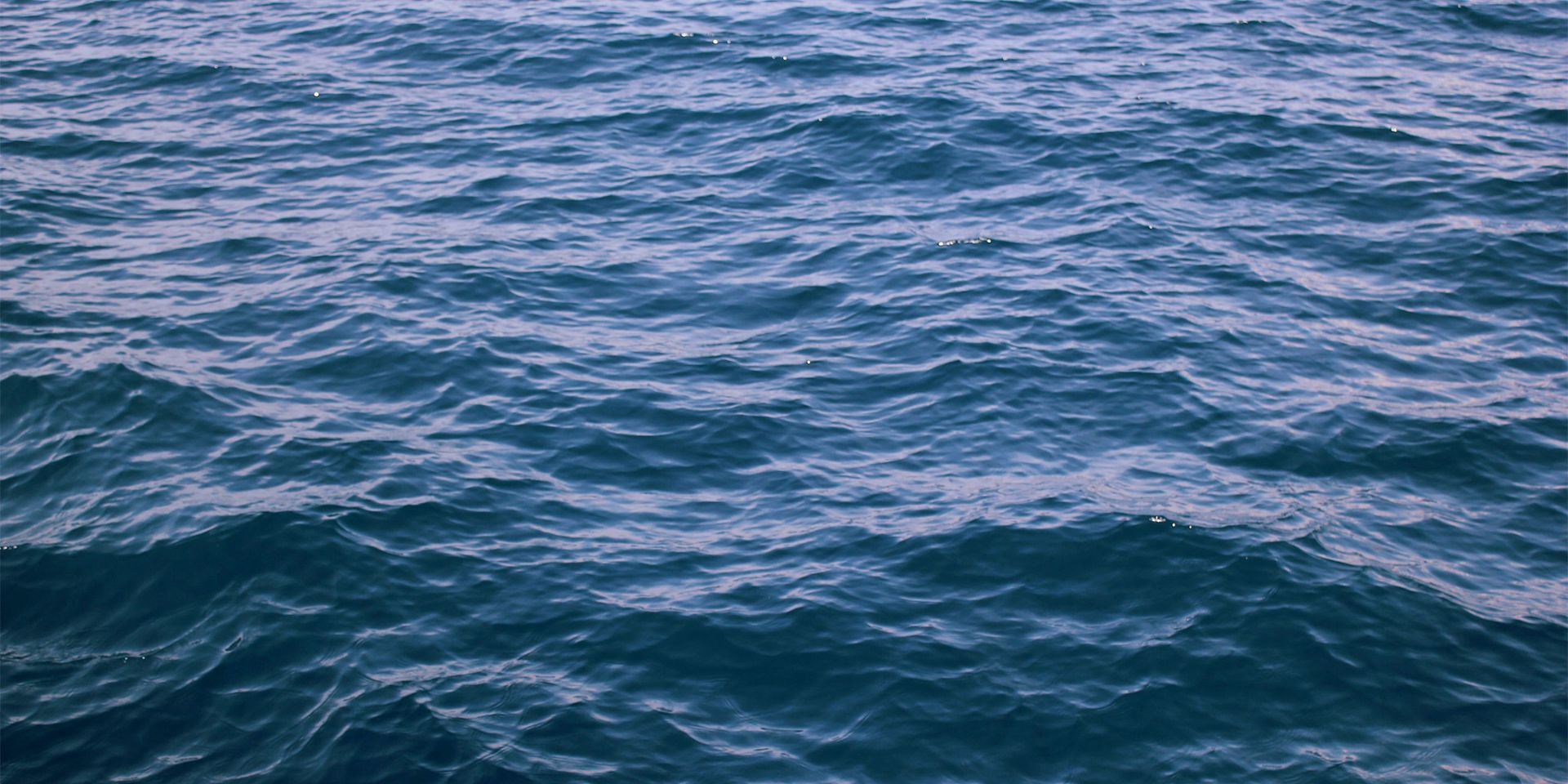Marine Mammal Co-Management Review in Alaska
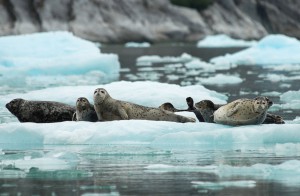
Harbor seals on ice. (NOAA Fisheries)
In 2017, the Marine Mammal Commission received a grant award from the North Pacific Research Board to identify essential components and key impediments to effective co-management of marine mammals in Alaska. The overall goal of this review was to strengthen relationships and support co-management to improve the conservation of marine mammals in a region where they provide food security for Alaska Natives and are also of critical ecological, social, and economic importance. The review identified findings that fell into seven overarching categories and were used to develop four recommendations, summarized in the Co-management Review Fact Sheet.
Check out the final report for the Co-management of Marine Mammals in Alaska: A Case Study-Based Review
Project Summary
Co-management of Alaska marine mammals is a key provision of the Marine Mammal Protection Act (MMPA). Under the authority of Section 119 of the MMPA, the U.S. Fish and Wildlife Service (FWS) and the National Marine Fisheries Service (NMFS) can enter into cooperative agreements with Alaska Native organizations (ANOs) to manage marine mammals harvested by Alaska Natives for subsistence and cultural purposes.
Project Objectives
- Develop a working definition of co-management under Section 119 that is acceptable to all ANOs and federal agency co-management partners.
- Identify important characteristics of, and major impediments to, effective co-management through:
- a review of existing co-management and cooperative agreements, and
- discussions with co-management partners and community members on their respective roles in establishing and maintaining effective co-management relationships.
- Provide recommendations for improving co-management relationships that account for the constraints of available resources .
- Create guidelines to aid in the creation of improved or new co-management agreements.
Project Timeline
January 2018 – March 2019
Steering Committee Members (from left to right in photo)
Jon Kurland: Assistant Regional Administrator for Protected Resources, NMFS Alaska Regional Office
Vera Metcalf: Executive Director, Eskimo Walrus Commission
Billy Adams: Assistant to the Director, North Slope Borough Department of Wildlife Management; Chairman, Ice Seal Committee, Hunter
Lauren Divine: Co-Director, Ecosystem Conservation Office at Aleut Community of St. Paul Island
Jennafer Malek: Marine Mammal Commission
Vicki Cornish: Marine Mammal Commission
Taqulik Hepa: Director, North Slope Borough Department of Wildlife Management; Vice-Chair, IPCoMM
Patrick Lemons: Chief, Marine Mammals Management, FWS Alaska Region
Peggy Osterback (not pictured): Executive Director, Aleut Marine Mammal Commission; Secretary/Treasurer, IPCoMM
Pamela Lestenkof (not pictured): Co-Director, Ecosystem Conservation Office at Aleut Community of St. Paul Island
Of the cooperative agreements established between ANOs and agencies, upon which co-management relationships are built, some have been more effective than others. A preliminary analysis suggests that the most effective agreements are those that emphasize strong communication between partners, agreement on information to be used in management decisions (stock assessments, harvest data, indigenous knowledge), and measures to resolve conflicts.
The primary objective of this review was to identify characteristics of, and impediments to, effective co-management. To help achieve this objective, we assembled a Steering Committee of Alaska Natives and federal resource managers from NMFS and FWS to guide the review and provide advice on engagement of co-management partners and community members.
At our March 2018 meeting, the Steering Committee developed a working definition of co-management for the purposes of the review that we used in discussions with stakeholders over the course of the review, including the Indigenous Peoples Council for Marine Mammals (IPCoMM) at their April and December Board of Directors meetings. Our working definition of co-management is: “a partnership based on trust and respect, established between an Alaska Native Organization, as defined by the MMPA, and either USFWS or NMFS, with shared responsibilities for the conservation of marine mammals and their sustainable subsistence use by Alaska Natives”.
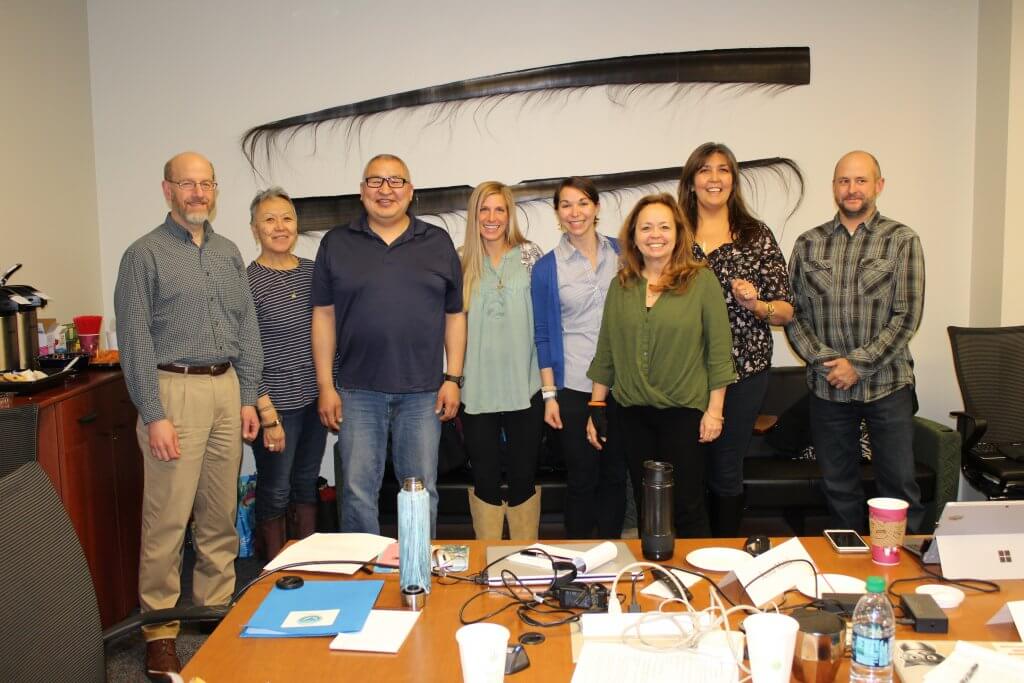
Co-management review Steering Committee. (Mike Miller)
To learn about the essential elements and key impediments of co-management, the Steering Committee identified three ANOs/cooperative agreements to use as case studies: Eskimo Walrus Commission (EWC), Aleut Community of St. Paul Island (ACSPI), and Aleut Marine Mammal Commission (AMMC). These case studies represented a diversity of Alaska marine mammal species and regions, and guided the selection of communities to visit to meet with marine mammal hunters, harvesters, and resource users. From May to September 2018, we conducted interviews with NMFS and FWS staff, and met with ANO members and hunters in St. Paul, Utqiaġvik (Barrow), Nome, Gambell, Savoonga, Atka, and Akutan. The Steering Committee also helped identify interviewees in each community we visited who were knowledgeable and willing to share their perspectives on co-management and subsistence activities.
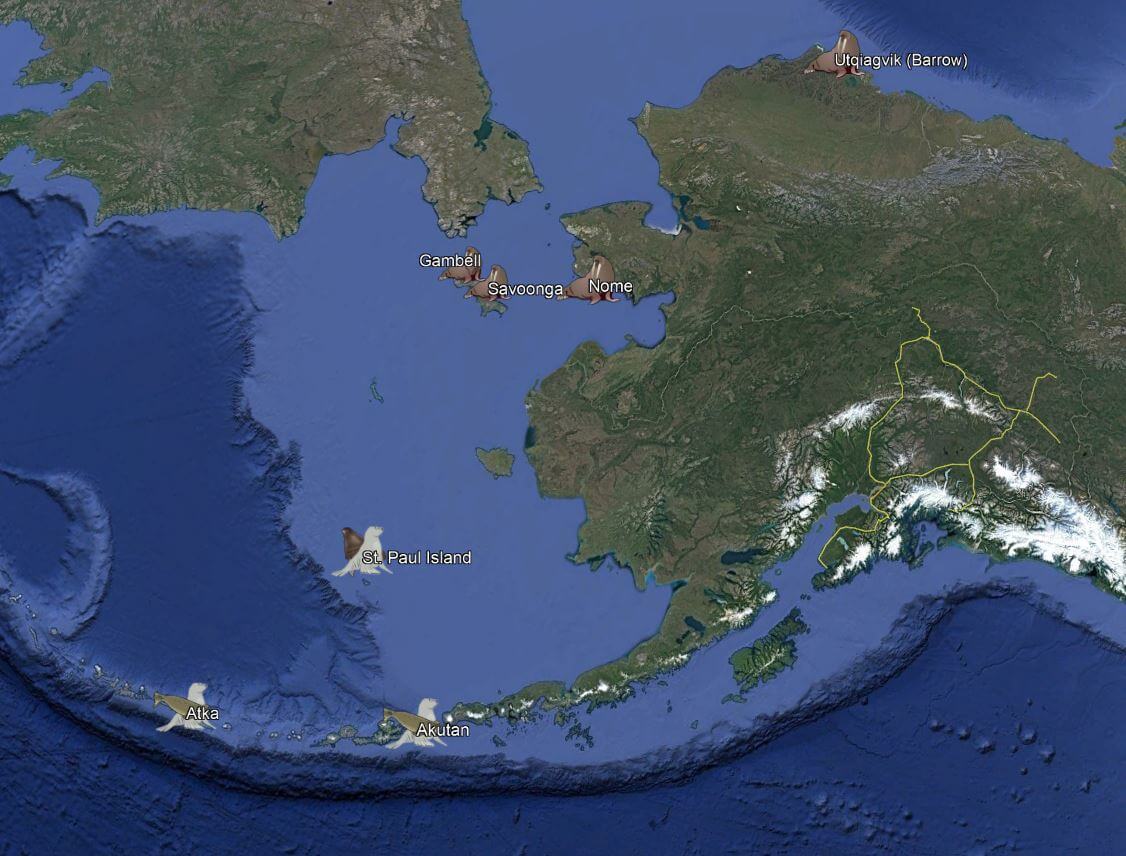
Locations of focus groups and interviews for co-management case studies.
Project Outcomes
The information collected during focus groups and interviews was used to identify findings based on common themes heard across participant groups. The study findings fell into the following categories:
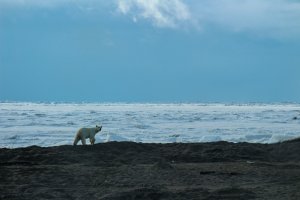
A polar bear along the shore of the Chukchi Sea in Utqiaġvik. (Jennafer Malek)
- Key Elements of Co-Management
- Partner Roles and Expectations
- Communication
- Organizational Structure and Accountability
- Leadership Training and Transitioning
- Agency Practices and Decision-Making Processes
- Challenge of Subsistence Use and the Future of Co-Management
Based on the findings, the Steering Committee developed recommendations and will suggest specific actions that the different co-management parties (agencies, ANOs, and communities) can take to help put the recommendations into practice. The Steering Committee recommends the following:
- Co-management partners should clearly define and mutually agree upon their respective roles, responsibilities, and accountability mechanisms, and should be more transparen regarding partner limitations
- Co-management partners and stakeholders should work cooperatively to strengthen communications, trust, and respect within and among partners
- New generations of Alaska Natives and new federal agency staff should be exposed to and provided opportunities to engage in a range of co-management activities
- The effectiveness and efficiency of co-management (ANO) structures should be assessed and alternative structural models should be considered, as appropriate
In early 2019 we traveled back to most of the participating communities and also met with federal agency staff to share the review findings and recommendations and gather feedback that was incorporated into the report. Returning to the communities and agencies was an important step in making sure Alaska Native community members, ANOs, and agency staff were informed of the final outcomes of the study and able to see how their input was incorporated into the report.
Our approach to identifying the key elements and major impediments to co-management involved working with all parties—federal agency partners, ANOs, and marine mammal hunters/harvesters
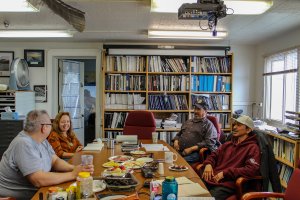
Participants of the hunter focus group in Utqiaġvik. (Jennafer Malek)
and resource users in coastal communities. That integrated approach would not have been possible without the guidance and support of our Steering Committee members and advisors, who also helped ensure that the review was conducted thoughtfully and respectfully. We would also like to thank the review participants for meeting with us and sharing their experiences and perspectives on co-management.
Next Steps
MMC is willing to facilitate further discussions with the federal agency and ANO co-management partners and communities, as appropriate, regarding how the findings and recommendations from this report can be used to continue to enhance co-management and conservation of marine mammals in Alaska.
Background
The 1994 amendments to the Marine Mammal Protection Act (MMPA) established Section 119 to enhance cooperative efforts to improve the conservation and management of marine mammals that are harvested by Alaska Natives for subsistence. Through Section 119, the U.S. Fish and Wildlife Service (FWS) and the National Marine Fisheries Service (NMFS) were encouraged to enter into cooperative agreements with Alaska Native organizations (ANOs) for the co-management of subsistence use of marine mammal species. The goal of Section 119 is to conserve marine mammals and provide co-management of marine mammals through a cooperative approach.
In 2008, the Marine Mammal Commission conducted a workshop to assess progress in co-management since the enactment of the 1994 MMPA amendments. In the time leading up to that workshop, ten cooperative agreements had been established between FWS or NMFS and ANOs, covering twelve marine mammal species. The agreements reflect a diversity of approaches to co-management: regional versus species-based, single species versus multiple species, and single tribe/village versus multiple tribes and regions. The 2008 review identified four themes critical to effective co-management of marine mammals:
- trust between partners
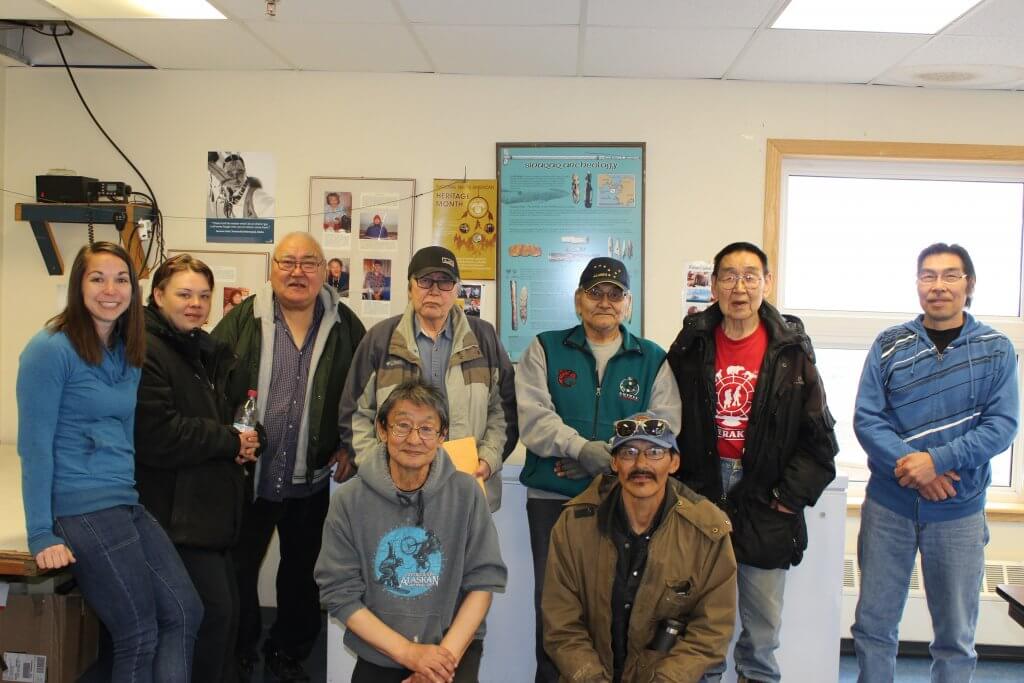
Participants from the hunter focus group in Savoonga on St. Lawrence Island. (Vera Metcalf, EWC)
- the need for ANO capacity building
- the need for funding and accountability, and
- the recognition that Alaska Native subsistence culture faces enormous threats from climate change.
During its 2016 listening sessions in Utqiaġvik, Kotzebue, and Nome, the Commission heard from community members that the quality of relationships between co-management partners had declined due to growing dissatisfaction with the co-management process and lack of adequate funding and other resources for implementing cooperative agreements. At a joint meeting with the IPCoMM at the end of the 2016 listening sessions, IPCoMM recommended that the Commission, in coordination with ANOs and federal agency co-management partners, facilitate a review of marine mammal co-management. This Review was developed in response to that recommendation, and is being conducted with the support of IPCoMM and its ANO members.
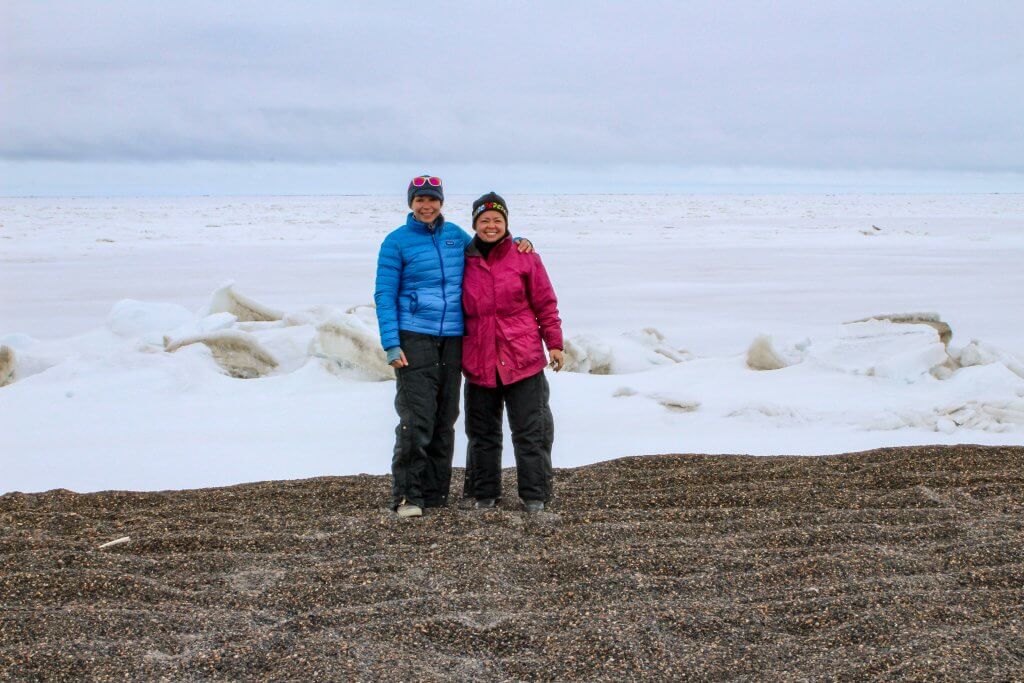
Co-PIs Jennafer Malek and Vicki Cornish visited Point Barrow during their trip to Utqiaġvik. (Billy Adams, North Slope Borough Dept. of Wildlife Management)
Principal Investigators
- Lead: Dr. Jennafer Malek, Marine Mammal Commission, Co-Management Fellow (now at NMFS Alaska Regional Office)
- Co-lead: Victoria Cornish, Marine Mammal Commission
Funding for this project was provided by the North Pacific Research Board
